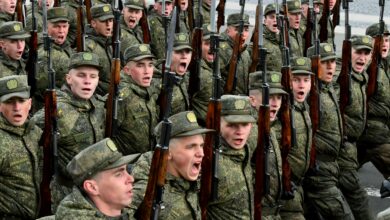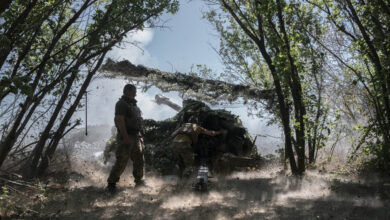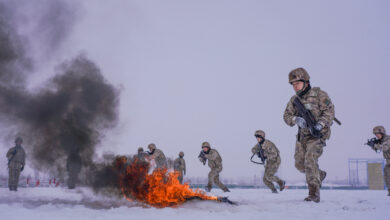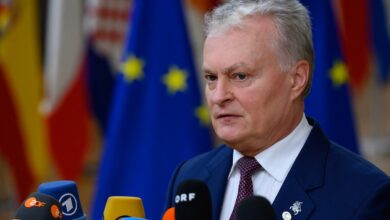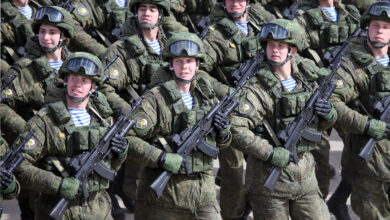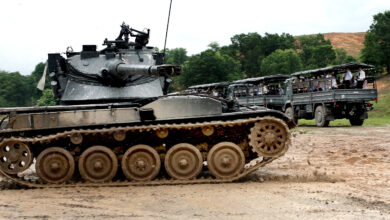Russia and the Central African Republic signed a military cooperation agreement on Tuesday, August 21, Russian news agencies reported.
Russian Defense Minister Sergey Shoygu and his CAR counterpart Marie-Noelle Koyara signed the document on the sidelines of Army-2018 defense expo outside Moscow.
The deal “will help strengthen ties in the defense sphere,” Shoigu was quoted as saying after the ceremony.
The agreement is set to deepen Moscow’s involvement in the impoverished Central African Republic, where the government is desperate to boost its armed forces in the fight against militias which control most of the country.
There were no immediate details, but Interfax reported that the accord would see Russia help with training for the Central African Republic Armed Forces (FACa).
Russian Deputy Defense Minister Colonel General Alexander Fomin said that the agreement will allow FACa personnel to study at Russian Defense Ministry universities, Interfax reported.
Fomin told Interfax that the pact was a “framework agreement” about general avenues of cooperation, including: “Exchange of delegations, education in Russian military institutes, mutual visits and so forth,” AFP reported.
Later on Tuesday, RJDH reported that, according to a document seen by RJDH, Central African Republic armed groups had expressed willingness to return to talks with the government under the auspices of the African Union. The groups issued 89 demands, 12 of which are “non-negotiable,” and the “non-negotiable” demands include “the revision or cancellation of military cooperation agreements with Russia and South Africa.”
Russian advisors already work with the CAR’s military and provide security and advice for President Faustin-Archange Touadera.
A United Nations arms embargo imposed in 2013 was last year lifted by the Security Council to allow delivery of Russian weapons for CAR’s armed forces.
The U.N. Security Council in January unanimously extended its sanctions against CAR until January 31, 2019.
France, Belgium, China and the United States have also recently supplied equipment for CAR’s military.
In July, the European Union extended its military training mission in the Central African Republic until 2020, pledging €25 million ($29 million) to help reform the country’s defense sector. The scope of the mission, known as the EUTM RCA, has also been modified to give strategic advice to the president’s cabinet, interior ministry and police, as well as the military.
in June, the E.U.’s diplomatic chief Federica Mogherini proposed a new €10.5 billion ($12.4 billion) “peace facility” that could pay for military equipment, including lethal weaponry, for partner countries in crisis zones such as the Central African Republic and Africa’s Sahel region.
In April, President Faustin Archange Touadera said he wants to “accelerate” the disarmament of members of armed groups in Central African Republic, calling for more peacekeepers to be deployed, and for the U.N.’s Minusca mission to transition from peacekeeping to peace enforcement.
Russian journalists murdered
The military cooperation agreement follows the murder in late July of three Russian journalists who were ambushed in Central African Republic while investigating Wagner, a shadowy Russian private military contractor group, and its possible relation to both government and rebel forces.
The investigation was funded by ex-oil tycoon Kremlin critic Mikhail Khodorkovsky. Both CAR authorities and Moscow have labeled the killings a robbery, but Khodorkovsky claimed this argument “does not stand up to scrutiny”.
A poor country beset by violence
One of Africa’s poorest countries, the CAR descended into violence in 2013 following the ousting of the majority-Christian country’s president, Francois Bozize, by a coalition of Muslim-majority rebel groups called the Seleka.
Within months, Seleka was officially disbanded, but many fighters refused to disarm, becoming known as ex-Seleka. Many others joined the mainly Christian anti-balaka militia to fight the Seleka, leading to a spiral of violence between groups along both religious and ethnic lines in which thousands died.
By the end of 2014, the country was de facto partitioned – anti-Balaka in the southwest and ex-Seleka in the northeast.
France intervened militarily to help force out the Seleka before handing on to the U.N. peacekeeping mission, Minusca.
President Touadera’s weak government controls around a fifth of the country and relies heavily on Minusca for support. The rest is controlled by at least 14 different militia groups who often fight each other for control of revenue from extortion, roadblocks or mineral resources.
Violence has led to thousands of deaths. Nearly 700,000 people are displaced, 570,000 are refugees abroad and 2.5 million are in need of humanitarian aid, according to the United Nations.
With reporting from AFP. This post was updated on August 21.




